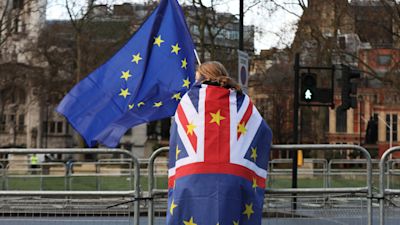Some glimmers of light in the Brexit talks but is it light at the end of the tunnel?

So out of the gloom of last week, we start this new one with tiny shafts of light appearing.
Light at the end of the tunnel? Too early to say, but it might be. The negotiators are still talking, they have no immediate deadline and some are now beginning to think there may be a path to success.
So what changed? We knew when Boris Johnson and Commission President Ursula von der Leyen decided not to pull the plug on the whole affair yesterday lunchtime that something was moving, though it was hard to determine what. But whatever it was, it was worth talking about for a little bit longer.
It does now appear that they may have found the beginnings of a way to solve the problem of what happens if (when) UK and EU standards diverge in the future.
What happens if the EU wants to upgrade its regulations on workers’ rights, health and safety or the environment, and the UK doesn’t want to follow suit.
The EU, recognising that this Free Trade Agreement, may still be with them years, decades hence, had wanted the right to impose tariffs if standards diverged.
No 10 thought this would turn them into ‘rule-takers’, and dismissed it as an affront to UK sovereignty.
And there it had looked as if matters may have rested. But both sides, it seems, took a final look into the abyss and decided to shuffle back from the edge.
The UK may now be prepared to accept the principle that there could be tariffs after future divergence, the EU agreeing that these tariffs may not be quick, or unduly onerous or be imposed without arbitration.
We don’t really know the details yet, but that’s not really the point. What’s important is that they have dismounted the pedestals they had climbed onto last week and moved into the murky middle ground where proper negotiation, haggling and ultimately compromise can take place. Which is a big step forward.
So while everyone continues to insist that no-deal is still a very real possibility, maybe still the most likely outcome, Michel Barnier was able to brief EU ambassadors this morning with the news that a deal could be reached this week.
Fish continue to be a problem, but the details are so obscure, and the relative importance to both economies so small that no one seriously believes fish will be allowed to derail the whole deal. Well, probably not, anyway.
There was one other thing Barnier mentioned: the timings are now getting absurdly late, and it’s inconceivable that a deal could be prepared, legally scrubbed, translated into 23 languages and then ratified by the European Parliament in time for January 1st.
So, he said, we may be in for a short period on ‘no-deal’ in the New Year until new arrangements can be put in place. This would be disruptive, but of limited duration.
The other possibility is that the EU could apply the deal provisionally, before the Parliament in Brussels ratifies it, avoiding that hiatus. This may - only may - be possible.
MEP’s don’t like it very much, which may not help with final ratification in the New Year, and anyway there may not even be time for that if talks go beyond the next few days.
But in the scheme of things, these problems are minor compared to what we were looking at with a collapse in the talks.
With the blame game and acrimony that would have followed, who knows how long it would have been before the talking began again.
Leaving the deal so late may not leave us in a great place, but it will be a whole lot better that not getting it done at all.